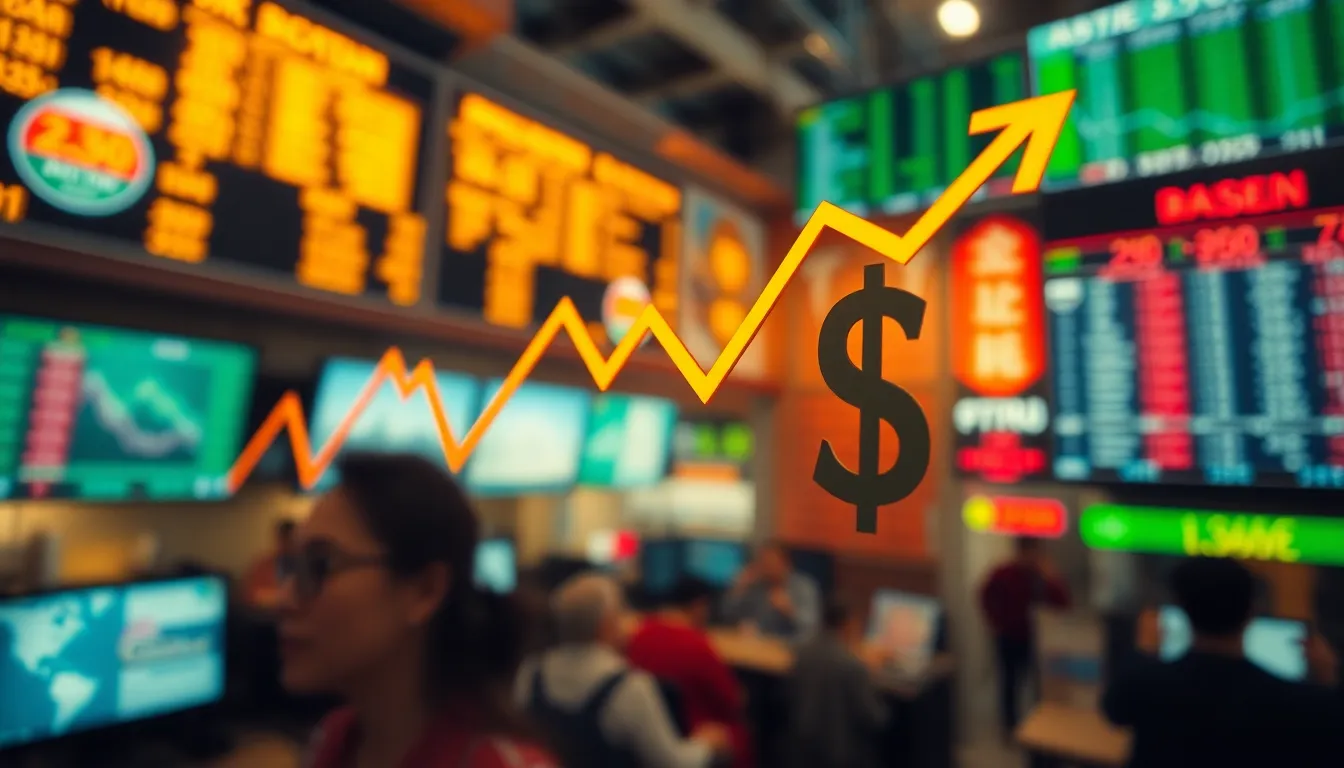Navigating the world of currency exchange can feel like trying to solve a Rubik’s Cube blindfolded. When it comes to the dollar to Korean won exchange rate, understanding the nuances can save you from feeling like you just dropped your wallet in a K-pop concert mosh pit. Whether you’re planning a dreamy trip to Seoul or simply curious about the latest financial trends, knowing how these two currencies interact is key.
Table of Contents
ToggleOverview of Exchange Rate Dollar to Korean Won
Understanding the exchange rate from the dollar to the Korean won is crucial for travelers and investors. Current rates fluctuate due to various economic factors. As of now, the exchange rate stands at approximately 1,300 KRW for 1 USD. This figure varies daily based on market conditions.
Investors often monitor this rate. Economic indicators from both the U.S. and South Korea influence these figures. Events like government policy changes, economic reports, and geopolitical developments impact the exchange rate stability.
Travelers should consider transaction fees when exchanging currency. Banks and exchange services often charge different rates. For example, some establishments may offer 1,290 KRW, while others may provide 1,305 KRW per dollar.
Understanding historical trends can also provide insight. The exchange rate fluctuated from under 1,100 KRW in 2018 to over 1,400 KRW in early 2023. These trends reflect both nations’ economic performance and international trade relations.
Investing in currency exchange can be advantageous. Proper timing based on market analysis allows for better returns. Immediate trends can indicate the right moments to exchange dollars for Korean won.
Monitoring resources from financial news platforms ensures they stay updated. Websites and apps often provide real-time currency rates and alerts. Staying informed aids in making sound financial decisions.
Factors Influencing the Exchange Rate

Numerous elements affect the exchange rate between the dollar and the Korean won. Understanding these factors aids in making informed financial decisions.
Economic Indicators
Economic indicators play a crucial role in determining the dollar to Korean won exchange rate. Metrics such as GDP growth, inflation rates, and unemployment figures provide insights into the economic health of both countries. For instance, robust GDP growth in the United States often strengthens the dollar against major currencies, including the won. Additionally, fluctuations in inflation rates can impact purchasing power, subsequently influencing exchange rates. Investors closely monitor these indicators to anticipate currency movements and adjust their strategies accordingly.
Political Stability
Political stability significantly affects currency exchange rates, including that of the dollar and the Korean won. A stable political environment fosters investor confidence, leading to stronger currency valuation. In contrast, political unrest or uncertainty can lead to volatility and depreciation of the local currency. For example, developments such as elections, trade agreements, or diplomatic relations directly impact market perceptions. Therefore, maintaining awareness of both countries’ political climates is essential for predicting potential movements in the exchange rate.
Historical Trends of Dollar to Korean Won
Analyzing the historical trends of the dollar to Korean won exchange rate reveals significant insights into economic conditions. Fluctuations in the exchange rate showcase the impact of local and global events.
Recent Fluctuations
In early 2023, the exchange rate surpassed 1,400 KRW per USD, reflecting economic uncertainty. Changes in government policies often drive short-term volatility. For example, between 2018 and 2023, the rate rose dramatically from below 1,100 KRW to current levels. Factors like geopolitical tensions and inflation have influenced these rapid shifts. Traders and travelers alike should monitor these movements to avoid unfavorable transactions.
Long-term Trends
Long-term trends show a more stable yet fluctuating relationship between the dollar and the won. From 2013 to 2018, the exchange rate hovered between 1,000 and 1,200 KRW. Economic growth in the U.S. typically correlates with a stronger dollar, while downturns create opportunities. Historical data indicates the importance of understanding these trends for investment decisions. Investors can leverage knowledge of past performance to navigate future currency markets more effectively.
How to Monitor the Exchange Rate
Monitoring the exchange rate between the dollar and the Korean won involves utilizing various tools and staying informed. Keeping track of these rates helps individuals make sound financial decisions based on current economic trends.
Tools and Resources
Online currency converters provide real-time exchange rates, helping users stay updated. Financial news websites often display current rates along with analyses, aiding in understanding market shifts. Mobile apps like XE Currency and OANDA allow for easy tracking on-the-go, offering historical data as well. Banking apps also offer exchange rate information, but rates may differ slightly from market averages due to service fees.
Tips for Travelers and Businesses
Travelers should exchange currency at reputable exchange services to avoid unfavorable rates. Knowing the average rate before exchanges aids in negotiations, especially at airport kiosks. Businesses relying on imports or exports benefit from setting up alerts for significant fluctuations to mitigate potential losses. Planning transactions during off-peak times can yield better rates, as market demand often drives price increases.
Navigating the dollar to Korean won exchange rate requires awareness and strategic planning. With the rate fluctuating around 1,300 KRW for 1 USD, staying informed about economic indicators and global events can make a significant difference. For travelers and investors alike, understanding the nuances of currency exchange helps avoid costly mistakes. Utilizing tools like online converters and mobile apps can facilitate tracking and decision-making. By being proactive and informed, individuals can optimize their currency exchanges and make sound financial choices.








